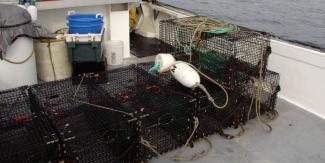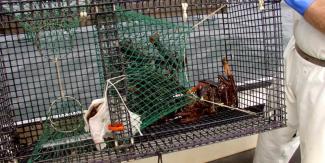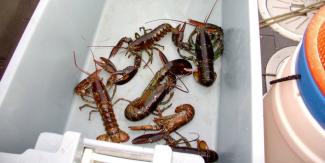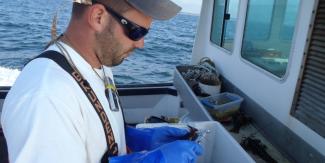Lobster Ventless Trap Survey
Background
The RI lobster ventless trap survey began in 2006 and was initiated to get bettwe estimates of juvenile lobster abundances. This is due to the habitat preferred by lobsters being rocky, and unavailable to sample by trawling surveys, which have traditionally been the primary source for fisheries-independent data.
Survey Design
The survey encompasses 3 regions within Rhode Island state waters, Narragansett Bay (7 stations), Block Island Sound (8 stations), and Rhode Island Sound (9 stations). Each region samples 7-9 randomly selected stations from June through August annually.
Survey Gear
Trap hauls consist of six pots, with 3 pots having vents that mimic commercial lobster pots and 3 pots without vents that better capture juvenile lobsters. Traps are set and retreived from commerical lobster vessels.
Sampling Methods
The traps are set on the groundline to alternate between ventless and vented pots. Pots and set and baited, then hauled back after a 3 night set. Lobsters are sampled and informaiton on sex, length, shell hardness, shell disease, egg stage, damage, v-notch status, cull, and other information is collected.
The bottom type, bait, location, surface temp, and depth are also collected for each haul, additionally the trap type is also recorded. Lengths of finfish and crustaceans are also recorded for anything else caught in the trap.
Sampling Frequency
Lobsters are sampled at each of the 7-9 randomly selected stations within the 3 regions twice monthly from June to September each year.
For more information about the survey please contact Corinne Truesdale.




